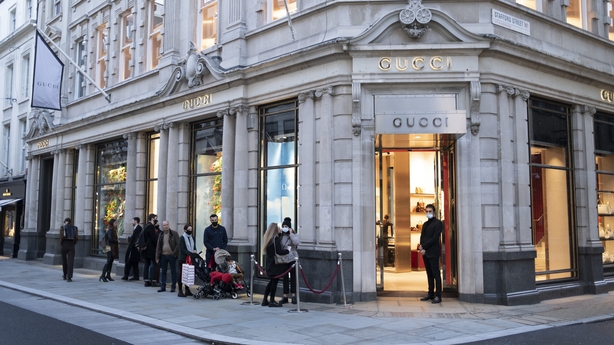Sales at Kering's star Gucci fashion brand fell more than expected in the fourth quarter as the Covid-19 pandemic kept consumers from travelling abroad and shopping.
Gucci accounts for 60% of revenues and 80% of profits at the French conglomerate, and has been one of the industry's top performers in recent years.
But it has struggled more than some peers in the Covid-19 crisis, despite a rebound in luxury goods demand in regions like Asia which fuelled resurging sales at rivals such as LVMH's Louis Vuitton.
Kering, which also owns brands such as Saint Laurent, said group revenue fell 8.2% to €4 billion in the three months from October to December.
This was down 5% on a comparable basis and missed analysts' consensus forecast cited by UBS for growth of 1%.
Gucci's sales were down 10.3% in the quarter on a comparable basis, when analysts had expected a 4% drop.
Kering's financial chief Jean-Marc Duplaix told reporters the group was satisfied with Gucci's performance, adding the brand had many initiatives planned to return to growth in 2021, its 100th anniversary.
Investors are keeping a close watch on the extent to which Gucci is losing steam after a hugely successful, quirky makeover under designer Alessandro Michele.
This saw its revenues more than double and profits treble between 2015 and 2019.
"To just look at 2020, quarter after quarter, is to take a short term view. We have a lot of actions to return to a path of growth, taking advantage of the recovery," Duplaix said.

Analysts said the earnings miss at Gucci was likely to weigh on the group's share price and trigger some changes to bolster the brand.
Duplaix said trends across China and Asia as well as the US remained supportive in the first weeks of the year for the luxury market, although Europe was tougher.
Kering can also find some comfort in the positive performance of its other, smaller brands, with Bottega Veneta in particular growing 2020 sales by nearly 5%.
Duplaix said the group was happy with how the year had started but gave no figures for current trading, including the key Chinese New Year holiday which this year fell in mid-February.
Restrictions on travel, dining out and other activities like skiing remain in place in many countries to fight the pandemic, weighing on tourist inflows and spending.

